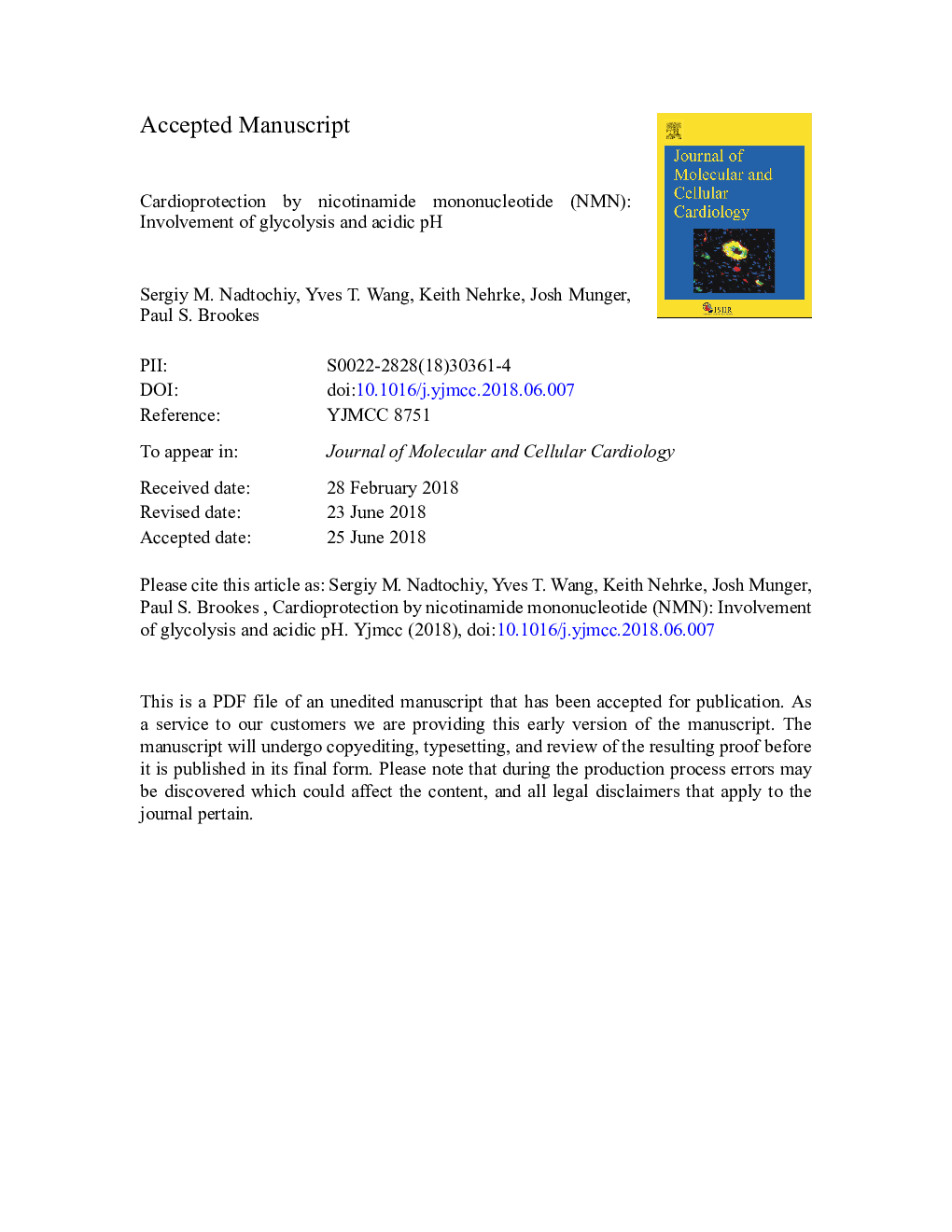| کد مقاله | کد نشریه | سال انتشار | مقاله انگلیسی | نسخه تمام متن |
|---|---|---|---|---|
| 8473134 | 1550384 | 2018 | 25 صفحه PDF | دانلود رایگان |
عنوان انگلیسی مقاله ISI
Cardioprotection by nicotinamide mononucleotide (NMN): Involvement of glycolysis and acidic pH
دانلود مقاله + سفارش ترجمه
دانلود مقاله ISI انگلیسی
رایگان برای ایرانیان
کلمات کلیدی
موضوعات مرتبط
علوم زیستی و بیوفناوری
بیوشیمی، ژنتیک و زیست شناسی مولکولی
بیولوژی سلول
پیش نمایش صفحه اول مقاله

چکیده انگلیسی
Stimulation of the cytosolic NAD+ dependent deacetylase SIRT1 is cardioprotective against ischemia-reperfusion (IR) injury. NAD+ precursors including nicotinamide mononucleotide (NMN) are thought to induce cardioprotection via SIRT1. Herein, while NMN protected perfused hearts against IR (functional recovery: NMN 42â¯Â±â¯7% vs. vehicle 11â¯Â±â¯3%), this protection was insensitive to the SIRT1 inhibitor splitomicin (recovery 47â¯Â±â¯8%). Although NMN-induced cardioprotection was absent in Sirt3â/â hearts (recovery 9â¯Â±â¯5%), this was likely due to enhanced baseline injury in Sirt3â/â (recovery 6â¯Â±â¯2%), since similar injury levels in WT hearts also blunted the protective efficacy of NMN. Considering alternative cardiac effects of NMN, and the requirement of glycolysis for NAD+, we hypothesized NMN may confer protection in part via direct stimulation of cardiac glycolysis. In primary cardiomyocytes, NMN induced cytosolic and extracellular acidification and elevated lactate. In addition, [U-13C]glucose tracing in intact hearts revealed that NMN stimulated glycolytic flux. Consistent with a role for glycolysis in NMN-induced protection, hearts perfused without glucose (palmitate as fuel source), or hearts perfused with galactose (no ATP from glycolysis) exhibited no benefit from NMN (recovery 11â¯Â±â¯4% and 15â¯Â±â¯2% respectively). Acidosis during early reperfusion is known to be cardioprotective (i.e., acid post-conditioning), and we also found that NMN was cardioprotective when delivered acutely at reperfusion (recovery 39â¯Â±â¯8%). This effect of NMN was not additive with acidosis, suggesting overlapping mechanisms. We conclude that the acute cardioprotective benefits of NMN are mediated in part via glycolytic stimulation, with the downstream protective mechanism involving enhanced ATP synthesis during ischemia and/or enhanced acidosis during reperfusion.
ناشر
Database: Elsevier - ScienceDirect (ساینس دایرکت)
Journal: Journal of Molecular and Cellular Cardiology - Volume 121, August 2018, Pages 155-162
Journal: Journal of Molecular and Cellular Cardiology - Volume 121, August 2018, Pages 155-162
نویسندگان
Sergiy M. Nadtochiy, Yves T. Wang, Keith Nehrke, Josh Munger, Paul S. Brookes,